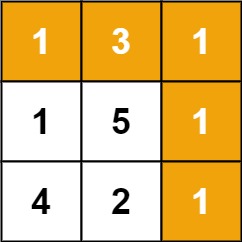LeetCode in Racket
64. Minimum Path Sum
Medium
Given a m x n grid filled with non-negative numbers, find a path from top left to bottom right, which minimizes the sum of all numbers along its path.
Note: You can only move either down or right at any point in time.
Example 1:

Input: grid = [[1,3,1],[1,5,1],[4,2,1]]
Output: 7
Explanation: Because the path 1 → 3 → 1 → 1 → 1 minimizes the sum.
Example 2:
Input: grid = [[1,2,3],[4,5,6]]
Output: 12
Constraints:
m == grid.lengthn == grid[i].length1 <= m, n <= 2000 <= grid[i][j] <= 100
Solution
; dynamic programming helper function
(define (mpsAux grid curpos dpTable ub)
(local
[(define (get grid pos) (list-ref (list-ref grid (car pos)) (cdr pos)))]
(cond
; return start value
[(equal? curpos (cons 0 0)) (car (car grid))]
; handle out of bounds
[(or (< (car curpos) 0) (< (cdr curpos) 0)) +inf.0]
; position appeared before
[(hash-ref dpTable curpos #f) (hash-ref dpTable curpos)]
; inductive case
[else
(let*
(
; go up
[u_val (mpsAux grid (cons (- (car curpos) 1) (cdr curpos)) dpTable ub)]
; go left
[l_val (mpsAux grid (cons (car curpos) (- (cdr curpos) 1)) dpTable ub)]
; compute the current least cost
[cur-least-cost (+ (get grid curpos) (min u_val l_val))]
)
(hash-set! dpTable curpos cur-least-cost)
cur-least-cost
)
]
)
)
)
; the (x . y) position of the grid is the x'th row and y'th column of the grid
(define/contract (min-path-sum grid)
(-> (listof (listof exact-integer?)) exact-integer?)
(local
[(define dpTable (make-hash))]
(let*
(
[curpos (cons (- (length grid) 1) (- (length (car grid)) 1))]
[least-val (mpsAux grid curpos dpTable 200)]
)
(inexact->exact least-val)
)
)
)

